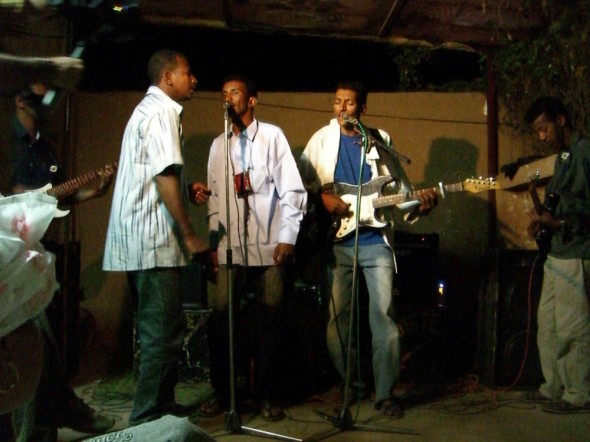The Poetics of the Sahara

There is a war going on in the desert and the primary weapon in the conflict is music. It is a war of land mines, night skies and the Rolling Stones. On the front lines there are many voices, though none so riveting as Omar “Bombino” Mochtar, and his band Group Bombino. Mochtar is a Tuareg, an ethic minority of North Africa known as the “blue men of the desert.” The Tuareg have never observed borders and live in a region they call the Ténéré—a land that stretches through modern Algeria, Libya, Mali, Niger and Burkina Faso. Over the last hundred years droughts and famines have caused them to alter traditional migration routes, which have in turn ignited armed conflicts with the various governments of the area. The conflicts have also given birth to a new musical movement called “Tuareg Blues”( though in North Africa it’s known as “Ishoumar,” and derived from the French word for ‘the unemployed.’)
The music’s founding fathers, Tinariwen, were a group of Tuareg’s from the Mali region that were recruited to fight by Omar Qadaffi . Gathered in rebel camps in Libya, the militiamen were exposed for the first time to reggae, blues and rock ‘n’ roll. A cross-pollination occurred and a sound of protest was born. Answering questions via email from Nigeria, Mochtar says, “We are looking for equality. Peace is not far from mind and the music is here to speak the truth, tell a story, an accurate picture of the world.”
Group Bombino’s latest album Guitars from Agadez Vol.2 sounds as if a group of psychedelic guitar wizards have traveled from ’70s to form a garage folk band. Recorded mostly in the desert, the LP is an even split of acoustic and electric virtuosity. There are field recordings, sounds of animals, herding bells, and a man declaring what must be the state of things in Tamashek (the Tuareg language). The acoustic tracks are Nick Drake’s Pink Moon gone nomad. They are also phenomenally layered blues riffs arranged around call and response style vocals and handclaps that evoke the same trance-like sound of the Band of Gypsys. Mochtar does not shy from this comparison (he is openly a fan.)
In the Ténéré all the musical equipment—like the land—is shared. There is no written law and music doubles as a code of ethics. It is a group project, so vital that the fate of a people rests on it. The liner notes for Mochtar’s last record express this very dire situation: “As of 2008, the Tuareg rebellion is in full force again, and Bombino is in exile to parts unknown. Agadez has been cut off from the rest of Niger. The only road that connects this legendary city with the rest of the country is littered with land mines and the only escorts are military.”
Mochtar seems undaunted. He says, “We will survive as we always have.” If the only force more destructive than man is nature, then the Tuareg are not only beating the odds but openly mocking them. It is hard to believe that anything could stop such a resilient people, certainly not explosives.
– Daniel Dehnhardt
Photography by Holly Parker

